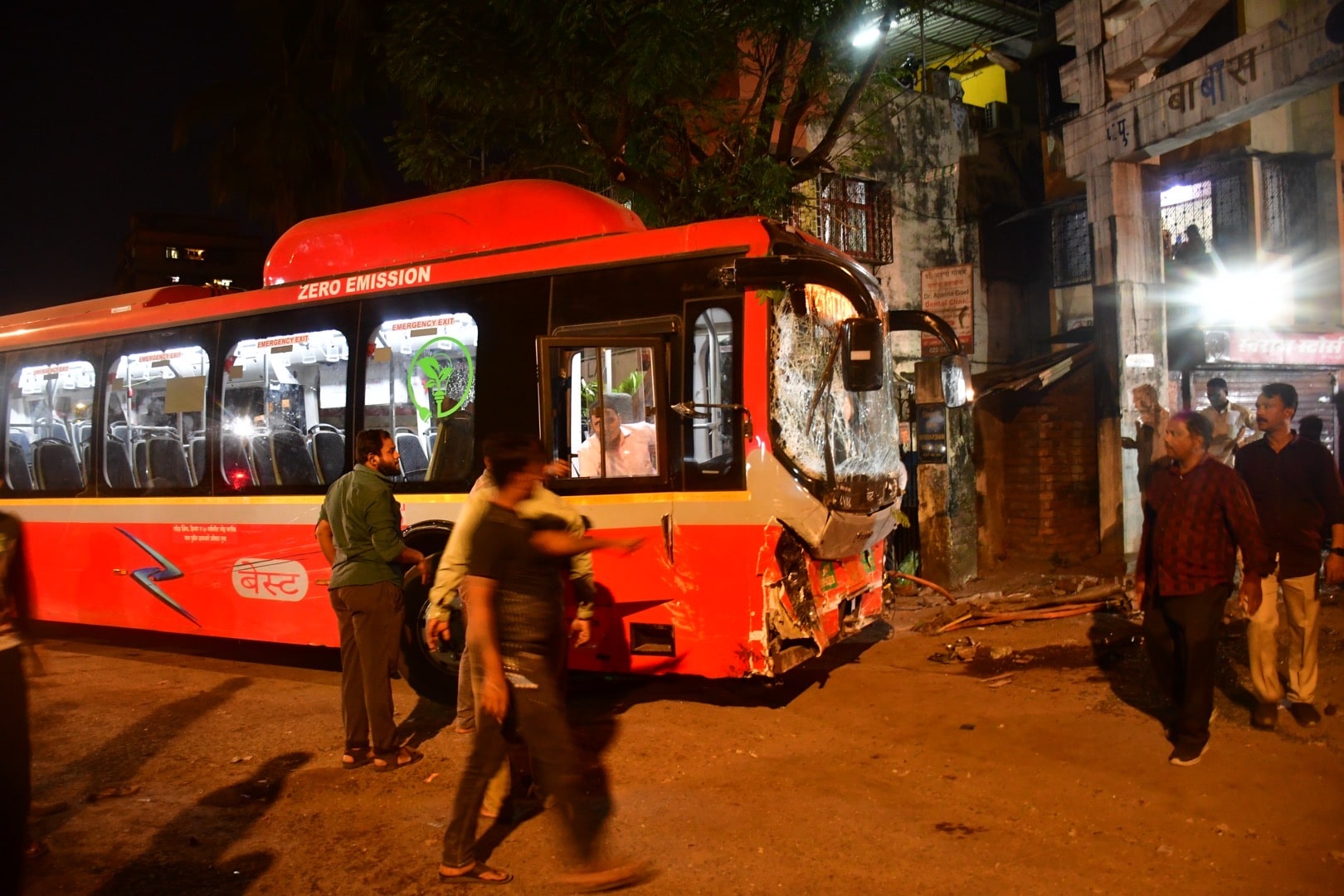The chilling bus crash in Mumbai’s Kurla, which left seven people dead and 42 others injured, has put under the spotlight inadequate training and poor work conditions of contractual drivers operating buses of Brihanmumbai Electric Supply and Transport, commonly known as BEST.
Fifty-four-year-old Sanjay More, who was driving the 12-metre-long electric bus when it crashed on Monday, was initially suspected to be drunk driving. There was also speculation on whether the brakes failed before the bus crashed into a housing society’s wall.
An inspection revealed that the brakes worked fine and the accident may have occurred due to More’s inadequate experience of driving electric buses. More has been charged with culpable homicide not amounting to murder. According to sources, he told police during questioning that he attended a one-day training in driving electric buses. He has said he has driven buses with manual transmission for years. Manual transmission vehicles have three pedals, while automatic electric ones have two. Drivers making a transition from manual to electric often face problems. Also, electric vehicles accelerate must faster compared to manual ones.

When NDTV spoke to contractual bus drivers working with BEST, they flagged poor pay and hasty training. They also said that because of the low pay, many of them work back-to-back shifts for an overtime allowance, meaning they drive without sufficient rest.
Permanent Drivers vs Contract Drivers
While permanent drivers working with BEST are paid nearly Rs 60,000 monthly, those on contract get Rs 24,000. Shashank Rao, general secretary of BEST workers’ union, said permanent drivers get a three-month training. “But these contract drivers are being brought without proper training. They don’t have adequate experience.”
Santosh Zinzore has 12 years of driving experience and has worked with BEST for four years. “I drove a manual transmission bus for two years and have been driving an electric bus for two years. Electric vehicles are easy to drive, but one needs time to understand the technique.”
Mr Zinzore said he had heard that More pressed the accelerator by mistake. “He was driving at 60 kmph. There are display screens and an all-round camera view. Everything can be seen,” he said, adding that he had trained for three weeks before he drove electric buses.

Contract Drivers’ Problems
A contract driver said that they received Rs 21,000 a month after deductions. “So many drivers opt for double shifts, meaning they are driving 16 hours a day. When buses don’t stop, people run and jump onto them. They don’t listen to the drivers at all.”
Union leader Shashank Rao said he does not consider the Kurla crash only the driver’s mistake. “Catch the contactor, they are working double shifts, the pay is not good, remove the contract system, nobody is taking responsibility. Even if the driver says the bus has a mechanical problem, the contractor gives a go-ahead.”
Why Is BEST Hiring On Contract
The big question then is why BEST is hiring drivers on contract. The answer lies in BEST’s growing financial problems. The state-run bus service has a debt of Rs 6,000 crore and relies on contract staff to cut costs. Of the 7,212 drivers BEST has now, only 649 — about 9 per cent — are permanent. Out of its 2,903 vehicles, 1,900 are on contract. Out of the 1,003 buses it owns, 750 will be scrapped in the next nine months. The company now needs an urgent infusion of funds. BEST has now urged BMC for an urgent assistance of Rs 2,132 crore. Of the buses BEST has taken on lease, 711 are electric vehicles aimed at reducing pollution.
About 32 lakh people board BEST buses daily but the service is reeling under poor frequency. Is hiking fares a solution for BEST’s problems? BEST public relations officer Sudas Sawant said, “We had considered hiking fares, but unless we bring new buses, people won’t take it well. So we have to increase the bus frequency first.”
RTI activist Jeetendra Ghatge said, “The fare should not be hiked. See the bus service in Delhi and women there travel for free.”

Kurla Crash A Blot For BEST
Besides local trains, BEST buses are considered a lifeline for Mumbaikars travelling far for work daily. BEST buses are the best option in areas not served by the suburban rail network and for people who cannot spend on daily commutes by auto-rickshaw or cabs. The Kurla crash has come as a big blot for his Mumbai lifeline. The deaths of seven people and visuals of an out-of-control bus ramming pedestrians and auto-rickshaws on a busy road have underlined the issues crippling this lifeline of the Maximum City. Within 48 hours of the Kurla crash, another accident involving a BEST bus left an elderly man dead. Activist Jeetendra Ghatge said, “Many people have been run over, drivers don’t stop, contract drivers are not skilled enough to navigate Mumbai roads.
BEST public relations officer Sawant admitted to the inadequate training mechanism for electric buses. “We will start from scratch. We have set up a committee to probe the Kurla crash, we will look at other issues too.”
![]()
